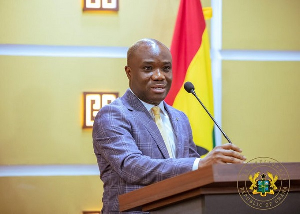Accra, Dec. 9, GNA – A survey report released by the Ghana Integrity Initiative (GII) on Friday identified the Police institution as the one perceived by many to be the most corrupt institution with a score of 4.6 per cent out of 5.0 per cent.
This is followed by Customs Division of Ghana Revenue Authority (GRA) with 4.1 per cent, political parties 3.9 per cent, the Executive 3.7 per cent, Judiciary 3.6 per cent and Parliament 3.3 per cent as the institutions mostly perceived to be affected by corruption.
The report, dubbed “Voice of the People Survey” also revealed that the Public and Civil Servants, Utility Providers, Education, Health, the Private Sector, the Media, Religious Bodies, Civil Society Organizations and NGOs followed in that order, as other institutions most perceived to be corrupt.
The survey undertaken in April this year included 2,096 respondents from 20 selected districts from all the regions and it disclosed that corruption was a serious problem in Ghana and that it was perceived to have been increased over the last three years, between April 2008 and April 2011.
Mr Vitus Azeem, Executive Director of GII who read the report of the survey, said the findings indicated that Government had not effectively addressed corruption while many citizens had refused to report corruption because they did not expect any serious action against the perpetrators.
He said the citizens believed that the same institutions perceived to be corrupt are those mandated to address the problem of corruption.
The report said the media had an important role to play in the fight against corruption while individuals could also make a contribution to curb the act by condemning and resisting corruption as well as reporting acts and pressurizing the government to act on credible reports of corruption.
It said 66 per cent of the respondents felt that greed and the desire for ostentatious living were the main reasons why people got involved in corruption, while low income and poverty, weak institutions and external pressures from family, friends and other social relationships were identified as other factors.
The report said corruption had a devastating effect not only on individual citizens but also on the country as a whole giving rise to lack of access to quality health care, quality education and potable drinking water as well as results in shoddy work with its resultant road carnage and loss of huge funds in kick backs, bribes and inefficiency.
It recommended that effective measures to fight the canker in the form of enacting few more laws, strengthening the existing laws, as well as the institutions set up to curb corruption.
The report said an effective anti-corruption strategy must include the investigation, arrest and prosecution of persons found to be culpable of corrupt acts thus making corruption an expensive venture.
It said Ghana needed an effective political leadership that was committed to fighting corruption and promptly bringing to book persons found culpable no matter their political affiliation, while stressing the need for more awareness creation on the Whistleblower Act 2006 and how and where to initiate complaints on corruption for redress.
The report recommended a strong code of conduct for civil and public servants and political appointees, especially those in positions which can influence resource allocation.
Mr Kwame Gyasi, Board Chairman of GII, said the release of the report coincided with the official day set aside by the UN as the International Anti-Corruption Day and that ceremonies were being held throughout the world on the event.
He said “…The fight against corruption, the challenges ahead are enormous and we must not kid ourselves. Stopping corruption, means upsetting long-standing power networks that control the rules of the game”.
General News of Friday, 9 December 2011
Source: GNA

















